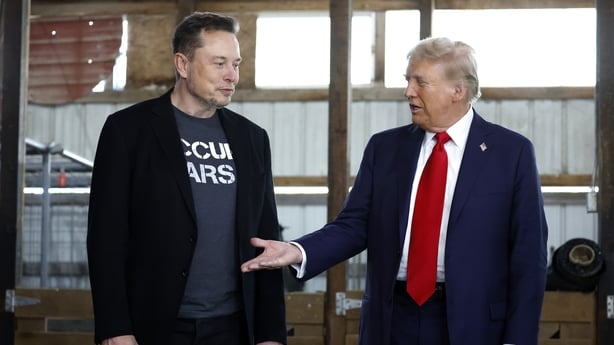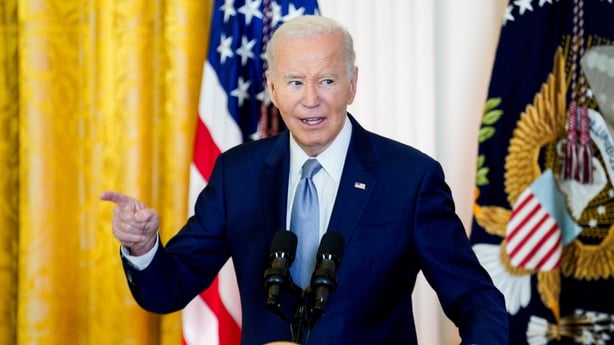US politicians are racing to prevent a government shutdown due to bite within hours, after Donald Trump and Elon Musk sabotaged a bipartisan agreement that would have kept the lights on well beyond Christmas.
With US government funding running out at midnight, the Republican-led House of Representatives needs to come up with a short-term fix to replace a funding package that looked like a done deal before the president-elect's intervention.
If no agreement is struck, federal agencies, national parks and other services will begin shuttering Saturday as the government prepares to send up to 875,000 workers home for the holidays without pay.
"If there is going to be a shutdown of government, let it begin now, under the Biden Administration," Mr Trump said on social media today, seeking to avoid blame for the chaos.
"This is a Biden problem to solve, but if Republicans can help solve it, they will," he added.

The race against the clock comes after a week of drama in Washington that began with Republican House Speaker Mike Johnson releasing a mammoth funding bill stuffed with unrelated measures that ballooned its cost.
Conservatives immediately voiced anger over the add-ons in the 1,547-page text, while Mr Musk - Mr Trump's incoming point man on government spending cuts - led a campaign bashing the deal.
Mr Trump dealt the fatal blow by demanding the deal be renegotiated to strip away much of the extraneous spending and to attach text suspending the country's self-imposed borrowing cap for two years.
The new demand - aimed at freeing up Mr Trump from debt negotiations - caught Republicans off-guard and they spent yesterday scrambling to write a new, pared-back package that could keep fiscal conservatives, Mr Trump, Mr Musk and Democrats happy.
We need your consent to load this rte-player contentWe use rte-player to manage extra content that can set cookies on your device and collect data about your activity. Please review their details and accept them to load the content.Manage Preferences
It proved an impossible task, with Democrats feeling betrayed over the collapse of the bipartisan agreement and dozens of Republicans rebelling against their own leadership.
"For decades, the Republican Party has lectured America about fiscal responsibility, about the debt and the deficit. It's always been phony," Democratic House Minority Leader Hakeem Jeffries said on the House floor.
Vice president-elect JD Vance blamed Democrats, arguing that they had "voted to shut down the government" in a bid to thwart Mr Trump's agenda - even though the Republicans are in the majority.
The failed vote marked the first major defeat for Mr Trump a month before he enters office, as he and Mr Musk had both thrown their weight behind the revised plan.
The White House's Office of Management and Budget has already begun contacting agencies about a potential shutdown, and Republicans have offered no clear path for getting a new bill through the House.

Funding the government is always fraught and politicians are under pressure this time around because they failed to agree on full-year budgets for 2025, despite months of negotiations.
Speaker Johnson has been facing criticism from all sides and his job looks under threat when he stands for reelection in January.
The Louisiana congressman was blamed for misjudging his own members' tolerance for the original funding patch's spiraling costs, and for being blindsided by Mr Musk and Mr Trump.
Democrats, who control the Senate, have little political incentive to help Republicans and Mr Jeffries has insisted they will only vote for the bipartisan package, meaning Mr Trump's party will have to go it alone on any further efforts today.
This is something the fractious Republicans - who can afford to lose only a handful of members in any House vote - have not managed in any major bill in this Congress.
Even if the bill had passed the House, it would have faced long odds in the Senate, which is currently controlled by Democrats.
The White House said Democratic President Joe Biden did not support it.
When he returns to office, Mr Trump aims to enact tax cuts that could reduce revenues by $8 trillion over ten years, which would drive the debt higher without offsetting spending cuts.
He has vowed not to reduce retirement and health benefits for seniors that make up a vast chunk of the budget and are projected to grow dramatically in the years to come.
The last government shutdown took place in December 2018 and January 2019 during Mr Trump's first White House term.
The unrest also threatened to topple Mr Johnson, a mild-mannered Louisianian who was thrust unexpectedly into the speaker's office last year after the party's right flank voted out then-Speaker Kevin McCarthy over a government funding bill.
Mr Johnson has repeatedly had to turn to Democrats for help in passing legislation when he has been unable to deliver the votes from his own party.
He tried the same manoeuvre, but this time fell short.
Several Republicans said they would not vote for Mr Johnson as speaker when Congress returns in January, potentially setting up another tumultuous leadership battle in the weeks before Mr Trump takes office.

